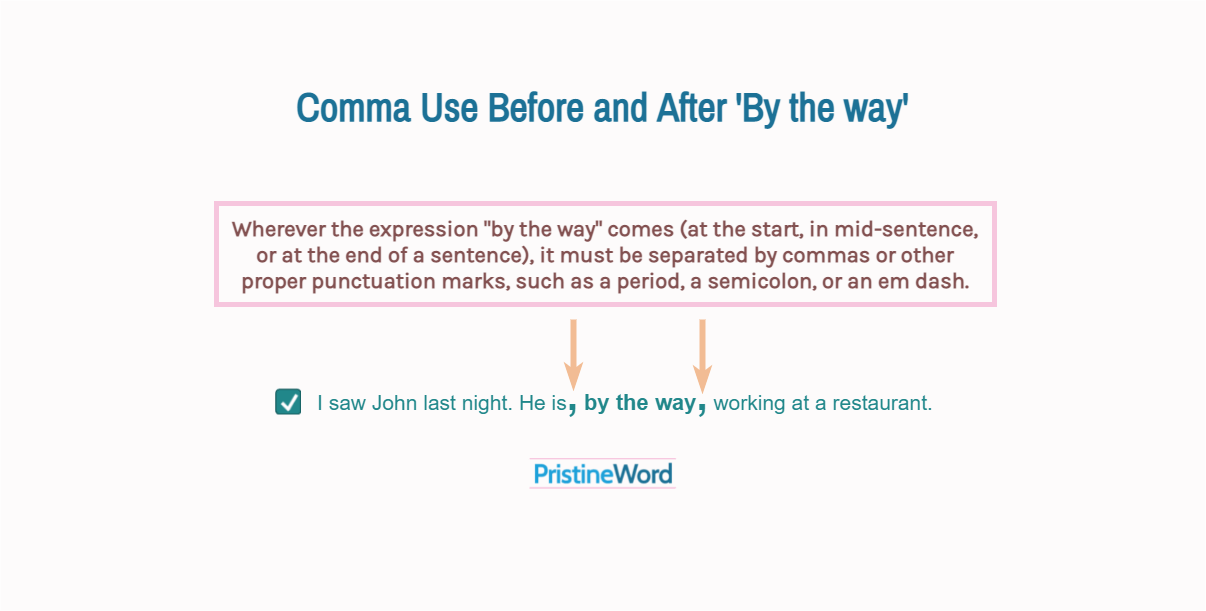Wherever the expression "by the way" comes (at the start, in mid-sentence, or at the end of a sentence), it must be separated by commas or other proper punctuation marks, such as a period, a semicolon, or an em dash.
Wherever the expression "by the way" comes (at the start, in the middle, or at the end of a sentence), it must be separated by commas or other proper punctuation marks, such as periods, semicolons, or em dashes.
I saw John last night. He is, by the way, working at a restaurant.
I saw John last night. He is by the way working at a restaurant.
We do not normally use commas when using "by the way" in its literal sense, that is, to indicate "a manner of doing something" or "during the course of a journey".
By the way Rebecca looks at you, I can tell that she likes you.
Contents
1. 'By the way' at the Start of a Sentence
We use a comma after introductory words and phrases, like "by the way", to separate them from the main part of the sentence.
By the way, you should change the motor oil before the next car journey.
By the way, you should change the motor oil before the next car journey.
A new sentence can also be preceded by a period or a semicolon.
I'm going to the movies with Jenny; by the way, I need money for the tickets.
Yes, Charles is from Houston, Texas. By the way, he is a very talented man.
Other introductory words, such as "well", "yes", or "no", should be followed by a comma when starting a sentence.
Recommended: Commas before and after "incidentally"
2. Using 'By the way' in Mid-sentence
In the middle of a sentence, "by the way" should be surrounded by commas to indicate the interruption of the sentence flow.
I've been monitoring my employees, and I must say, by the way, that I am disappointed with their performance.
I've been monitoring my employees, and I must say by the way that I am disappointed with their performance.
The use of an em dash replaces a comma before or after "by the way".
My husband is wealthy—by the way, I need to buy a new dress.
Similarly, other expressions and words that interrupt the sentence flow, such as "on the other hand", "after all", "however", or "nevertheless" need to be separated by commas in mid-sentence.
3. Ending a Sentence With the Expression 'By the way'
We put a comma in front of "by the way" at the end of a sentence to signal that the previous remark adds incidental or extra information.
She is considering to change the will, by the way.
She is considering to change the will by the way.
4. 'By the way' Without Commas
In previous sections, we have covered the comma use before and after the expression "by the way" when meaning "incidentally" or "additionally". In its literal or basic sense, on the other hand, we can use "by the way" to indicate:
- a manner or method of doing something, or
- during the course of a journey.
We do not usually need a comma before or after "by the way" in sentences like these:
We realized that Mary is a talented young politician by the way she talks.
I was impressed by the way the police officer conducted the investigation.
5. More Examples
- She is not a friend of mine. By the way, I don't like her too much.
- Didn't you know that Peter dropped out of college? By the way, he is now working at a supermarket.
- My uncle went to China last month; by the way, I love Chinese food.
- I want you to present the project plan to a new client. The meeting is next Monday, by the way.
- Mary follows a Mediterranean diet, which is, by the way, based on healthy fats and fresh vegetables.
- Middle school is often difficult. By the way, Olivia has to do her homework.
- We need to go to the Chicago next week; by the way, did you book the flight online?
- Do you agree with James? I can't understand what he is saying, by the way.
- Tomorrow we'll discuss the topics of chapters 6 and 8. By the way, what time is it?
- I love your T-shirt. By the way, where did you buy it.
- I went to Thailand, which is, by the way, a very hot country.

